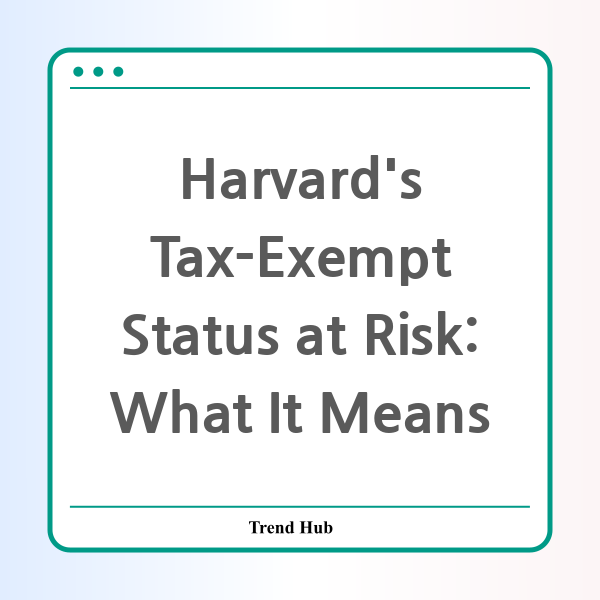* This website participates in the Amazon Affiliate Program and earns from qualifying purchases.

Is Harvard's Tax-Exempt Status in Jeopardy?
As the oldest and wealthiest university in the United States, Harvard University is currently caught in a fierce battle with the Trump administration regarding its federal funding and tax-exempt status. This ongoing dispute raises pressing questions: What does tax-exempt status mean for educational institutions, and how could losing it impact the university and its future?
Understanding Tax-Exempt Status
Tax-exempt status allows organizations like universities, charities, and churches to bypass federal income and property taxes, enabling donations to these entities to be tax-deductible for donors. According to the IRS, eligible organizations should be charitable, religious, educational, scientific, and more, operating in ways that benefit the public rather than private individuals.
For Harvard, maintaining this status is critical as it could otherwise face significant financial repercussions, potentially costing the university billions of dollars in lost donations and funding. The appeal of tax-exempt status lies not only in financial relief but also in the enhanced credibility it provides, attracting wealthy benefactors eager to support educational endeavors.
The Current Stand-off
Recently, the Trump administration has imposed a funding freeze on Harvard, worth approximately $2.2 billion, after the university resisted pressure to make substantial changes to its hiring, admissions, and curriculum policies. Harvard has emerged as a symbol of resistance against the administration's demands, which has intensified the scrutiny of its tax-exempt status.
As a result of the ongoing tension, Harvard's research programs, especially those related to public health, have faced immediate impacts. Researchers are scrambling to adjust to these funding disruptions, which could compromise vital studies in areas such as tuberculosis and cancer treatments.
Legal Challenges Ahead
In response to the funding stand-off, some faculty members at Harvard have already taken proactive legal measures by filing a lawsuit aimed at protecting the university's financial resources from unjust federal intervention. There are concerns that this standoff could escalate into an expensive and prolonged legal battle, further complicating Harvard's financial stability.
Beyond the financial implications, the Department of Homeland Security has threatened to revoke Harvard's ability to enroll international students if it fails to comply with federal directives. This potential loss poses a significant risk to the university's diverse academic community and future international partnerships.
What Lies Ahead?
With the stakes so high, Harvard must carefully consider its next steps. The institution may be contemplating a shift from its firm opposition to finding a middle ground with the administration to avoid legal entanglements and to secure essential funding. At the same time, Harvard has garnered public support for its stance, which might provide leverage in negotiations.
The conflict illustrates broader tensions between educational institutions and government authorities, highlighting the complexities surrounding funding, policy compliance, and institutional autonomy.
As Harvard navigates this uncertain terrain, the implications of its tax-exempt status will likely reverberate across other universities and charitable organizations, prompting critical discussions about the role and responsibilities of educational institutions in the current socio-political landscape.
* This website participates in the Amazon Affiliate Program and earns from qualifying purchases.